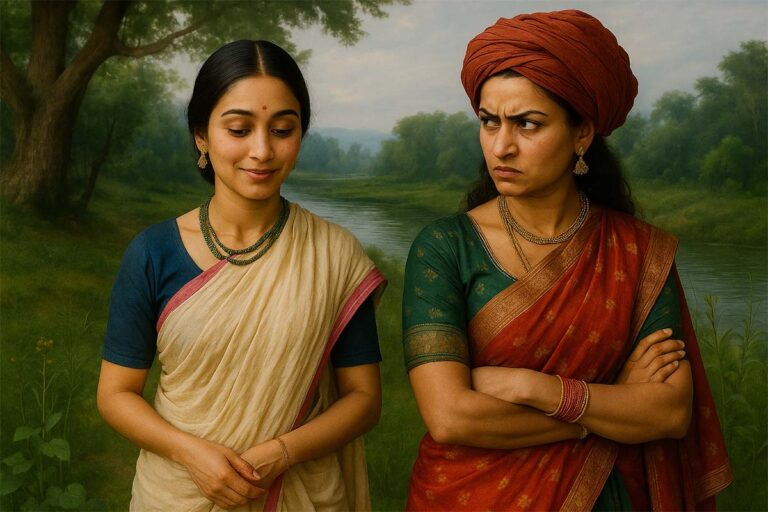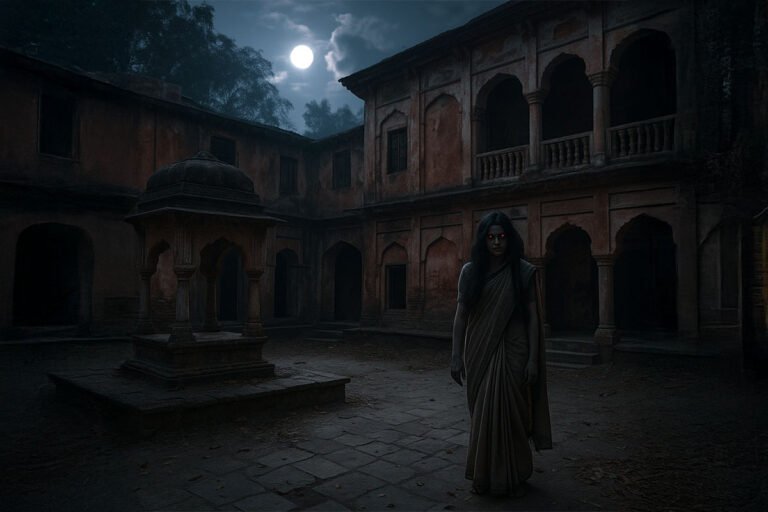In the illustrious past of ancient Odisha, when the salty sea breeze whispered tales of brave Sadhabas traversing the treacherous waves for distant trades, a story was woven into the rich tapestry of folklore. This tale was of a girl named Tapoi, whose life’s journey would forever be etched in the heart of Odia’s heritage.
Her father, Tanayavanta, a merchant of unparalleled wealth and prestige, showered affection upon his eight children, but none more so than his youngest, Tapoi. A radiant gem in their family crown, she was the object of her father’s adoration and her brothers’ fierce protectiveness. She revelled in the lap of luxury, her time filled with laughter and games alongside the children of fellow nobles. Her innocent laughter echoed through the grand halls of their home, a melody more precious than any treasure.
During an ordinary day of child’s play, Tapoi drew the gaze of an old woman. Intrigued by Tapoi’s pretend-play with grains and winnows, the woman offered a peculiar proposition. “Why not ask your parents for a golden winnow, or even a golden moon? It suits your stature more than these ordinary toys,” she suggested. These seemingly innocent words set the wheel of fate into motion.
Swayed by their beloved daughter’s wish, Tanayavanta summoned the finest jewellers in the land, commissioning a grand golden moon adorned with diamonds. However, in a cruel twist of fate, as the moon was being crafted, Tapoi’s father breathed his last, and by the time the beautiful creation was completed, her mother too had joined him in the celestial abode.
Wrapped in the cloak of grief, Tapoi’s brothers held true to their Sadhaba bloodline, deciding to resume their maritime trade. However, their hearts ached at leaving their little sister behind. Thus, they entrusted their wives with a solemn duty – to care for Tapoi, to envelop her in the love and warmth that they themselves would have showered.
One day an old beggar woman came to their house for alms. She told the eldest woman of the family that they must not indulge their sister-in-law, who was much younger to them and that all that they were doing to her would bring them no good. She would tell her brothers all kinds of things against them and turn them against them. They must send her to the forest to graze their goats. There, in the forest, one day or the other, a tiger or a snake would kill her. They could tell her brothers when they returned that she had died of illness.
From then on, Tapoi’s bad days started. The child was forced to wear torn clothes and was sent to graze the family’s goats in the forest. A little rice was all she was given to eat. Except for the youngest, her sisters-in-law made her life miserable. The eldest was the cruellest. Once a week, when the turn of the youngest sister-in-law came to give her food, did the girl eat her fill.
One evening it was stormy and the goat named “Gharamani” got lost in the forest. Tapoi’s eldest sister-in-law went wild. She threatened her with dire consequences if she did not bring the goat home that very night and she looked for a knife to cut off her nose. The terrified girl ran into the forest to find the goat. She shouted “gharamani, gharamani” loudly many times but to no effect.
Then with a prayer in her heart to goddess Mangala, she called for her and she heard the goat bleating. She returned home with the goat. The eldest sister-in-law cooled down a bit but did not give her food that night. The food that she gave her on the following day was so bad that the girl threw it away and starved. She decided not to return home that evening. It would be much better, she thought, to be gobbled up by a tiger or bitten by a snake in the forest than undergo torture at home day in and day out. As the night fell, she was frightened and wept aloud bemoaning her fate.
That very night her brothers returned and were still on their boats when they heard the piteous cry of the girl. They sent their youngest brother to find out who was crying and to cut a long story short, the brothers and the sister met. When they saw her piteous condition and heard from her how she had been tortured, they were furious. The following day when their wives came to the boat to welcome them ceremonially, they asked them where Tapoi was. They told their husbands that she could not come because she was ill. They asked their wives to go one by one and offer worship to the goddess in the boat. Dressed as a goddess, Tapoi cut off the noses of her six sisters-in- law, one after another. When the youngest sister-in-law went to her, she threw away the knife and embraced her. “I am alive because of you”, she told her,” You are my mother.”
The six women with bloodied noses decided not to return home and ashamed, they went deep into the forest, where they fell prey to a huge tiger. Some days later, Tapoi was married off to a Sadhaba named Birnanchi in a wedding that could rival a royal ceremony in splendour.
The tale of Tapoi would forever serve as a cautionary tale, imprinted in the annals of Odia folklore.









2 Responses
Wonderful
Thank you for your kind words and for taking the time to leave a comment.